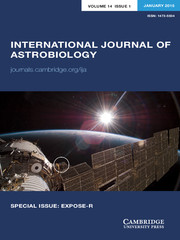Article contents
Complex structures synthesized in shock processing of nucleobases – implications to the origins of life
Published online by Cambridge University Press: 26 May 2021
Abstract
Nucleobases are nitrogenous bases composed of monomers that are a major constituent of RNA and DNA, which are an essential part of any cellular life on the Earth. The search for nucleobases in the interstellar medium remains a major challenge, however, the recent detection of nucleobases in meteorite samples and laboratory synthesis in simulated analogue experiments have confirmed their abiotic origin and a possible route for their delivery to the Earth. Nevertheless, cellular life is based on the interacting network of complex structures, and there is substantial lack of information on the possible routes by which such ordered structures may be formed in the prebiotic environment. In the current study, we present the evidence for the synthesis of complex structures due to shock processing of nucleobases. The nucleobases were subjected to the reflected shock temperature of 3500–7000 K (estimated) and pressure of about 15–34 bar for over ~2 ms timescale. Under such extreme thermodynamic conditions, the nucleobases sample experiences superheating and subsequent cooling. Electron microscopic studies of shock processed residue show that nucleobases result in spontaneous formation of complex structures when subjected to extreme conditions of shock. These results suggest that impact shock processes might have contributed to the self-assembly of biologically relevant structures and the origin of life.
- Type
- Research Article
- Information
- Copyright
- Copyright © The Author(s), 2021. Published by Cambridge University Press
Footnotes
Currently at: National Institute of Oceanography, Goa, India.
References
- 5
- Cited by



